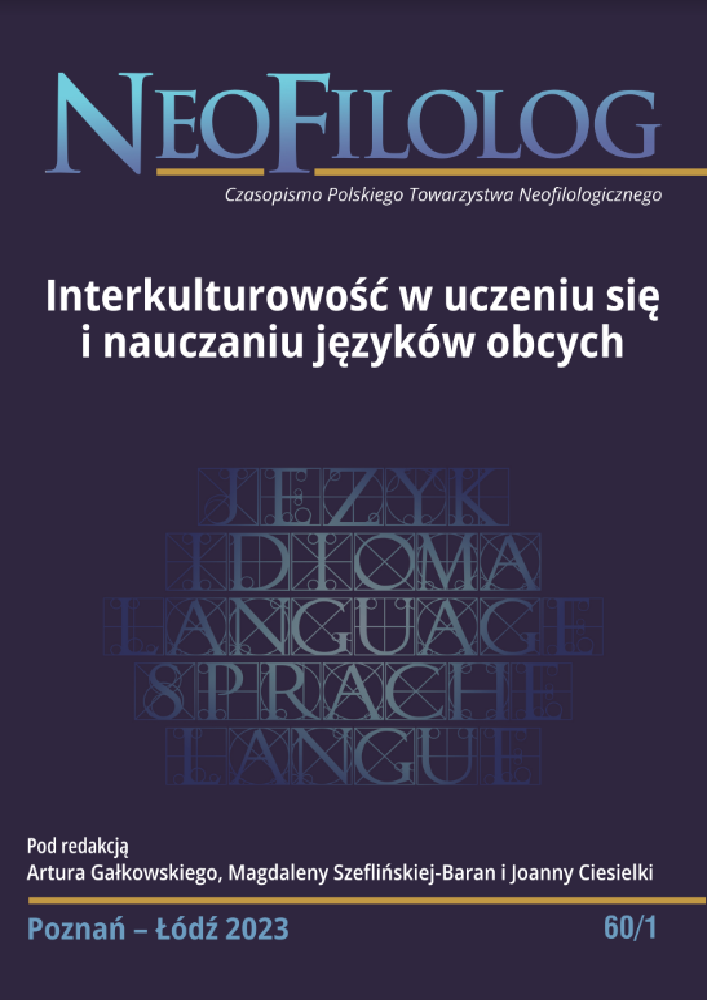Abstract
The purpose of this article is to analyse the image of the family in the Italian Civil Code. This study is carried out from a linguistic point of view. Passages on the family will be analysed in order to present the roles of the man and woman in marriage. The terminological evolution will be shown by comparing the 1942 Code and the 2022 Code. The aim of the study is to point out how the analysis of a legal text can contribute to a better understanding of a country's culture.
References
Aristi D. (2005), L’enseignement du culturel et de l’interculturel dans la classe de français langue étrangère, (in:) Pamuła M., Pytlarz A. (a cura di), L’Europe des langues et des cultures. Tome I Didactologie des langues-cultures. Synergies Pologne, Sylvains-les-Moulins : Gerflint, pp. 180-184.
Balboni P. E. (1999), Dizionario di Glottodidattica. Perugia: Guerra Edizioni.
Benucci A. (2005), La competenza interculturale, (in:) Diadori P. (a cura di), Insegnare italiano a stranieri. Firenze: Le Monnier, pp. 32-43.
Berruto G. (2019), Fondamenti di sociolinguistica. Bari-Roma: Edizioni Laterza.
Bobbio N. (1950), Scienza del diritto e analisi del linguaggio. “Rivista trimestrale di diritto e procedura civile”, n. 2, pp. 342-367.
Cavagnoli S. (2015), Il linguaggio giuridico rispettoso del genere: un’analisi sulle norme della genitorialità, (in:) Dragotto F. (a cura di), Grammatica e sessismo. Lavori del seminario interdisciplinare. Roma: UniversItalia, pp. 49-58.
Cortelazzo M. (1994), Lingue speciali. La dimensione verticale. Padova: Unipress.
Di Lucia P. (1994), Tre opposizioni per lo studio dei rapporti tra diritto e linguaggio, (in:) Scarpelli U., Di Lucia P., Jori M. (a cura di), Il linguaggio del diritto. Milano: LED Edizioni Universitarie, pp. 9-23.
Falcone A. (2014), Diritto di famiglia: la potestà genitoriale cede il posto alla responsabilità genitoriale. “Filodiritto. Quotidiano di Diritto, Cultura e Società”. Online: https://www.filodiritto.com/diritto-di-famiglia-la-potesta-genitoriale-cede-il-posto-alla-responsabilita-genitoriale [accesso 19.09.2022].
Mackiewicz M. (2009). Jeszcze raz o „modelu z Tybingi”, (in:) Mackiewicz M. (a cura di), Dydaktyka języków obcych a kompetencja kulturowa i komunikacja interkulturowa. Poznań: Wydawnictwo Wyższej Szkoły Bankowej, pp. 55-62.
Mancini Palamoni G. (2018), La lingua italiana: patrimonio culturale da preservare e valorizzare perché vettore della storia e dell’identità della comunità nazionale. “Federalismi.it”, n. 11/2018. Online: https://www.federalismi.it/nv14/articolo-documento.cfm?Artid=36349 [accesso 19.09.2022]
Morra L., Bazzanella C. (2002), Considerazioni sul ‘buon padre di famiglia’. “Rivista Critica del Diritto privato”, n. XX(4), pp. 529-563.
Mortara Garavelli B. (2001), Le parole e la giustizia. Divagazioni grammaticali e retoriche su testi giuridici italiani. Torino: Piccola Biblioteca Einaudi.
Mourlhon-Dallies F. (2008), Enseigner une langues à des fins professionnelles. Paris: Didier. DOI: https://doi.org/10.14375/NP.9782278069989
Sabatini F. (2017), Il linguaggio normativo come uso prototipico della lingua, (in:) Le parole giuste. Scrittura tecnica e cultura linguistica per il buon funzionamento della pubblica amministrazione e della giustizia. Roma: Senato della Repubblica e Università di Pavia, pp. 113-116.
Serianni L. (2007), Italiani scritti. Bologna: il Mulino.
Zając J. (2011), L’interculturalité en classe de langue, (in :) Sowa M. (a cura di), L’interculturel en pratique. Lublin: Werset, pp. 24-32.
Codice Civile (1942), Gazzetta Ufficiale, 4 aprile 1942.
Codice Civile (2022), Altalex.
License
Copyright (c) 2023 Anna Kucharska

This work is licensed under a Creative Commons Attribution-NoDerivatives 4.0 International License.
Authors
Authors of texts accepted for publication in Neofilolog are required to complete, sign and return to the Editorial team’s office the Agreement for granting a royalty-free license to works with a commitment to grant a CC sub-license.
Under the agreement, the authors of the texts published in Neofilolog grant Adam Mickiewicz University in Poznań a non-exclusive, royalty-free license and authorize the use of Attribution-NoDerivatives 4.0 International (CC BY-ND 4.0) Creative Commons sub-license.
The authors retain the right to the free disposal of the work.
Users
Interested Internet users are entitled to use works that have been published in Neofilolog since 2017, under the following conditions:
▪ attribution – obligation to provide, together with the distributed work, information about the authorship, title, source (link to the original work, DOI) and the license itself.
▪ no derivatives – the work must be preserved in its original form. Without the author's consent, it is not possible to distribute the modified work in the form of translations, publications, etc.
Copyrights are reserved for all texts published since 2017.
Miscellaneous
Adam Mickiewicz University in Poznań retains the property right as a whole (layout, graphic form, title, cover design, logo etc.).

